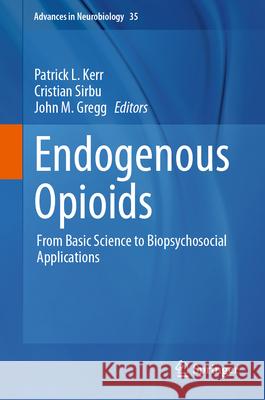Endogenous Opioids: From Basic Science to Biopsychosocial Applications » książka



Endogenous Opioids: From Basic Science to Biopsychosocial Applications
ISBN-13: 9783031454929 / Angielski
Endogenous Opioids: From Basic Science to Biopsychosocial Applications
ISBN-13: 9783031454929 / Angielski
(netto: 881,78 VAT: 5%)
Najniższa cena z 30 dni: 848,19
ok. 16-18 dni roboczych.
Darmowa dostawa!
Preface
Chapter 1: Introduction to the volume: The Journey Ahead
Patrick L. Kerr, Cristian Sirbu, and John Gregg
Chapter 2: The Foundational Science of Endogenous Opioids and Their Receptors
Simona Tache, Patrick L. Kerr, and Cristian Sirbu
Chapter 3: Interactions Between Endogenous Opioids and the Immune system
Wei Du
Chapter 4: The Opioid Growth Factor in Growth Regulation and Immune Responses in CancerGerald R. Hankins and Robert T. Harris
Chapter 5: Role of Endorphins in Breast Cancer Pathogenesis and RecoveryDavid H. Nguyen
Chapter 6: Modulatory Processes in Craniofacial Pain States
Barry J. Sessle
Chapter 7: Enkephalin Rescues Temporomandibular Joint
Pain Related Behavior in Rats
Karin N. Westlund and A. Caitlynn Iddings
Chapter 8: Endogenous Opioids and Exercise-Related Hypoalgesia:
Modern Models, Measurement, and Mechanisms of Action
Allan H.Goldfarb, Robert R. Kraemer, and Brandon A. Baiamonte
Chapter 9: Pain, Fear, Anxiety, and Stress: Relation to
the Endogenous Opioid System
Nicholas J. Felicione, Melissa D. Blank, Casey D. Wright,
and Daniel W. McNeil
Chapter 10: The Roles of Endogenous Opioids in Placebo and Nocebo Effects:
From Pain to Performance to Prozac
Patrick L. Kerr and John M. Gregg
Chapter 11: Physical Exercise as an Intervention for Depression: Evidence for
Efficacy and Mu-Opioid Receptors as a Mechanism of Action
Colleen Pettrey, Patrick L. Kerr, and T.O. Dickey
Chapter 12: The Endogenous Opioid System as a Pathway of Positive Emotions
Jennifer Barenz, Maeve O’Donnell, and Joey Smith
Chapter 13: Endogenous Opioids and Volunteering: On the Evolutionary Significance of Helping OthersAlina Simona Rusu, Ph.D.
Chapter 14: Endogenous and Exogenous Opioids: Role in
Substance Use Disorders
Lindsay Acree, Pharm.D., AE-C
Chapter 15: Endogenous Opioid Activity as the Mechanism of Action for
Mitragyna Speciosa (Kratom): The Current State of the Evidence
Adina Bowe and Patrick L. Kerr
Chapter 16: Endogenous Opioids in the Homeostatic Regulation
of Hunger, Satiety, and Hedonic Eating: Neurobiological Foundations
Marcela Rodriguez Flores and Sylvana Stephano Zúñiga
Chapter 17: Role of Endogenous Opioids in the Pathophysiology
of Obesity and Eating Disorders
Sylvana Stephano Zuniga, Marcela Rodriguez Flores, and Adriana Albu
Chapter 18: Integration of Endogenous Opioid System Research
in the Interprofessional Diagnosis and Treatment of Obesity
and Eating Disorders
Marcela Rodriguez Flores and Sylvana Stephano Zuniga
Chapter 19: The Role of Endogenous Opioids in Cardioprotection
Cristina Sirbu, M.D.
Chapter 20: Endorphins, Sexuality, and Reproduction
Marjan Khajehei, PhD MSc, BSc, RM
Chapter 21: Depression, Cancer, Inflammation, and Endogenous Opioids:
Pathogenic Relationships and Therapeutic Options
Jennifer Hancock, Cristian Sirbu, and Patrick L. Kerr
Dr. Patrick Kerr completed his Master’s and doctoral degrees in clinical psychology at the University of North Dakota. He completed his pre-doctoral internship training at the West Virginia University School of Medicine-Charleston campus and Charleston Area Medical Center. Dr. Kerr is a clinical psychologist, specializing in the treatment of severe psychopathology, suicidality, and traumatic stress. He is currently an Associate Professor in the Department of Behavioral Medicine and Psychiatry at West Virginia University School of Medicine-Charleston. He serves as Director of the WVU Behavioral Science and Psychopathology Research Division, and as Director of the WVU Dialectical Behavior Therapy Services Program.
His main lines of research and academic work emphasize common mechanisms of severe psychiatric disorders, emotion regulation, suicide risk, trauma, and the psychobiological mechanisms of psychopathology.
Dr. Cristian Sirbu is a Clinical Associate Professor at West Virginia University School of Medicine-Charleston campus and Charleston Area Medical Center (CAMC) and a Research Scientist at the CAMC Center for Cancer Research. He completed his dental and psychology doctoral degrees in Romania and a clinical psychology doctoral degree at Marshall University.
His scholarly and clinical work are focused on assessment and treatment of anxiety, mood disorders and chronic pain across multiple populations and the enhancement of psychosocial interventions using pharmacological and technology-based approaches. He is interested in immunological mechanisms of psychopathology and the implementation of Patient-Reported Outcomes in oncology.
Dr. John Gregg is a retired oral and maxillofacial surgeon and who served in academic positions at multiple institutions during his career. Dr. Gregg’s academic career has included appointments as Professor of Surgery at University of North Carolina, Virginia Tech University, and Virginia Commonwealth University. During his academic and professional training, he completed five degrees as well as clinical residency in Oral and Maxillofacial surgery at the University of Michigan.
Dr. Gregg’s preclinical research was the first to demonstrate that peripheral injury of rodent trigeminal nerves may produce neuroanatomic pathoses in the transganglionic and central spinal trigeminal complex. He continues his active program of clinical research post-retirement, with an emphasis on mechanisms of neuropathic pain and microsurgical management of trigeminal nerve injuries.
This new volume provides a scientifically based exploration of the multifaceted world of endogenous opioids, including endorphins, enkephalins, dynorphins, endomorphins, and orphanin FQ/nociceptin, featuring a strong translational focus. Topics covered range from basic scientific investigations, to clinical applications, to investigations in areas such as oncology, childbirth, and disordered eating, to psychosocial contexts such as volunteering and positive emotions. One of the main goals of Endogenous Opioids is to provide recommendations for new directions in medical research and health policy that are rooted in sound scientific research.
1997-2026 DolnySlask.com Agencja Internetowa
KrainaKsiazek.PL - Księgarnia Internetowa









